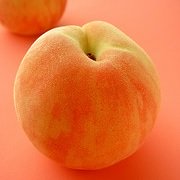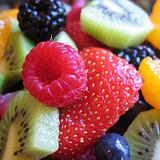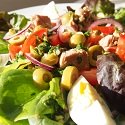Peach Nutrition Facts,
Health Benefits of Peaches
All about peach nutrition information, calories in a peach, peach nutrients, nutritional benefits of peaches
A peach is similar to a nectarine, but has a luxurious velvety skin with a yellow or white flesh. This fruit is very juicy and sweet tasting – one serving (100g or 3.5oz) contains nearly 10g of carbohydrates.
A peach is very low in calories, just 39 calories per serving. Fat is almost non-existent and they contain no cholesterol, so are ideal for a snack or as a dessert.
They provide a good source of vitamin C, and a modest amount of vitamin A along with other vitamins and minerals. In the centre of a peach is a large stone, this should be thrown away as it can be toxic. Peaches are great for digestion and are believed to help our complexion. They will also boost your immune system. Eating a peach fresh is the best way to take advantage of its nutrients
Peaches bruise very easily, so be selective when purchasing. You’ll know if the peach is ripe if it yields slightly to the touch. If the fruit is ripe, eat it on the same day, as they will go off quickly, otherwise the fruit will continue to ripen once you have purchased it.
Compare peach nutrition facts to the other fruits.
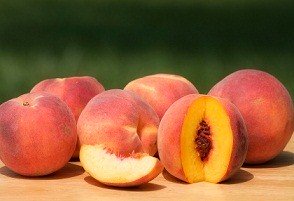
Nutritional Value of Peaches
| Peach nutritional value per 100 g (3.5 oz) Refuse: 4% (Pit) Scientific Name: Prunus persica |
||
|---|---|---|
| Proximates: | ||
| Nutrients | Peaches, raw | Peaches, dried, sulfured, uncooked |
| Water | 88.87 g | 31.80 g |
| Energy | 165 kJ (39 kcal) | 1000 kJ (239 kcal) |
| Protein | 0.91 g | 3.61 g |
| Carbohydrates | 9.54 g | 61.33 g |
| Total Fat: | 0.25 g | 0.76 g |
| Fiber | 1.5 g | 8.2 g |
| Cholesterol | 0 mg | 0 mg |
| Minerals: | ||
| Calcium, Ca | 6 mg (0.6 %) | 28 mg (3%) |
| Iron, Fe | 0.25 mg (1.4 %) | 4.06 mg (23%) |
| Magnesium, Mg | 9 mg (2 %) | 42 mg (11%) |
| Phosphorus, P | 20 mg (2 %) | 119 mg (12%) |
| Potassium, K | 190 mg (4 %) | 996 mg (28%) |
| Sodium, Na | 0 mg | 7 mg (0%) |
| Zinc, Zn | 0.17 mg (1 %) | 0.57 mg (4%) |
| Copper, Cu | 0.068 mg (3 %) | 0.364 mg (18%) |
| Manganese, Mn | 0.061 mg (3 %) | 0.305 mcg (15%) |
| Selenium, Se | 0.1 mcg (0.1 %) | 0.5 mcg (1%) |
| Vitamins: | ||
| Vitamin C | 6.6 mg (11 %) | 4.8 mg (8%) |
| Thiamine (Vit. B1) | 0.024 mg (6 %) | 0.002 mg (0%) |
| Riboflavin (Vit. B2) | 0.031 mg (2 %) | 0.212 mg (12%) |
| Niacin (Vit. B3) | 0.806 mg (4 %) | 4.375 mg (22%) |
| Pantothenic acid (B5) | 0.153 mg (1.5 %) | 0.564 mg (6%) |
| Vitamin B6 | 0.025 mg (1 %) | 0.067 mg (3%) |
| Folate (Vit. B9) | 4 mcg (1 %) | 0 mcg |
| Vitamin A | 326 IU (7 %) | 2163 IU (43%) |
| Vitamin E | 0.73 mg (4 %) | 0.19 mg (1%) |
| Vitamin K | 2.6 mcg (3 %) | 15.7 mcg (20%) |
| Percentages are relative to US Recommended Daily Intake (RDI) for adults. | ||
Author: Lana Soko
You Might Also Like:
Like This Page?
|
Share This Page:
|
Search Our Site:

Free E-Book:
We Recommend:
Looking to get your body into great shape? Get the very best results for your efforts and money! Save your valuable time from surfing the internet. These are theBestselling Weight Loss Programs
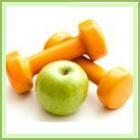
Programs that work and have thousands of satisfied customers worldwide!

 |
